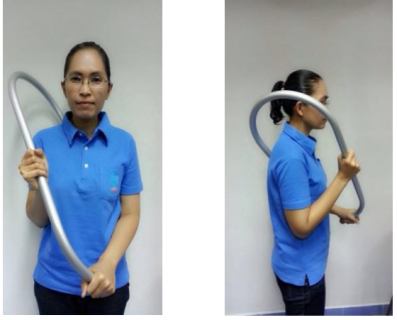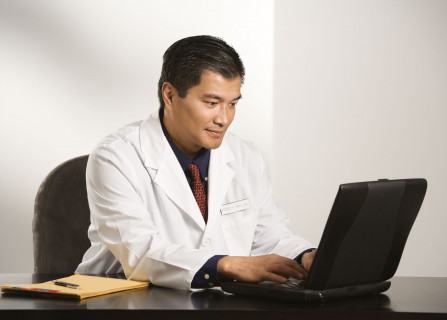Massage and trigger point therapy for calf pain, with self help options

Muscular problems including trigger points have been shown to be a major cause of calf pain. Massage and trigger point therapy have been shown to give excellent relief, plus have also been shown to (1–6):
- increase mobility and flexibility,
- improve balance,
- reduce nocturnal pain and cramps, and
- reduces post exercise soreness.
In this article we’ll discuss the various muscles and trigger points that cause calf pain, including how you can examine these yourself. Most qualified therapists can help you with these, however, most muscular problems need many applications of therapy which can be expensive, so where possible we will give you safe effective self treatment options.
CONTENTS
What are trigger points
The muscles that commonly cause calf pain
Trigger point examination
Self massage and trigger point therapy techniques
How to massage and do trigger point therapy to your calf muscles
Appendix: other causes of calf pain
Professionals
References
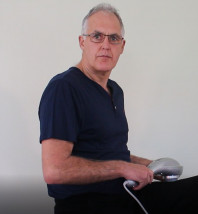
Graeme’s comments
Clinical trials have shown that massage/trigger point therapy is effective for calf pain, plus provides a host of other benefits. However, there are many other possible causes of calf muscle pain, such as those listed below. Of particular concern is deep vein thrombosis. Because of this I ask that you to get properly checked by a professional for specific advice. The following is the advice I’d typically give patients if it was appropriate.
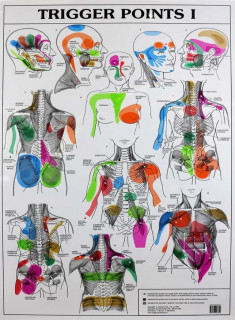
What are trigger points
Simply speaking, trigger points are those tender lumps in your muscles that therapists find. We have a lot more information about them in our article Trigger point basics. In summary, they start as small lumps that you only know are there when a therapist presses on them and they shoot pain. Over time they develop until they shoot pain without being pressed upon, and are arguably the biggest cause of musculoskeletal pain. Even before spontaneously shooting pain trigger points cause muscles to tighten, lose strength and fatigue quickly.
The muscles that commonly cause calf muscle pain

The following muscles are those that commonly cause calf pain (7). In the diagrams I’ve shown where the common trigger points are (x).
- gastrocnemeus (gastrocs) and soleus
- tibialis anterior and posterior
- the peroneal muscles
Trigger point examination
It is best to have a professional show you how to examine for trigger points so you learn the correct techniques and can be sure that what you find is a trigger point. However the basic examination technique is very simple. You start by using flat fingers and moderate pressure as shown to examine your muscles for tight or tender areas. If you find a tight or tender area use one or two fingers to examine deeper, looking for tight bands of muscle. Along these tight bands of muscle you may find a tender harder part (lump) that may shoot pain when it is pressed upon. These lumps are likely trigger points.


Self massage and trigger point therapy techniques
Self therapy technique one: basic massage
I’ve demonstrated this technique in this video and on my forearm muscles because it is easy to see. Imagine your muscle is like an old sponge and you are squeezing out the gunk. Apply pressure with your thumb or something else appropriate and slowly move along the muscle.
- Massage like this must be done towards your heart because your lymphatic (drainage) vessels and veins have one way valves. Massaging the other way would be trying to force fluids the wrong way through these one way valves.
- Work systematically to cover all the muscle
- Repeat the process using gradually more pressure to penetrate deeper.
This basic massage procedure can be easily modified to turn it into a very effective trigger point therapy. All you need to do is when you get to a tight spot/ trigger point stop and hold the pressure for 5-10 seconds before slowly moving on.
Self therapy technique two: “Thai” self trigger point therapy
Professional therapists use various techniques based upon applying pressure direct to the trigger point. There are a lot of people advising to do this at home with balls, rollers and other tools. As I discuss in Do foam rollers work I have grave reservations about these. In practice as a chiropractor I’ve seen way to many people hurt themselves using these and not a lot of benefits. On the other hand there is a traditional Thai home therapy technique that appears to be very safe and was shown to be very effective in a trial treating upper back pain (8) . It uses a special tool with a long handle to apply moderate pressure to relaxed muscles. Each day each trigger point was given five applications of this moderate pressure for five seconds each. The big differences between this technique and foam roller/ balls are:
- you are not getting into difficult positions and the muscles you are treating can be relaxed,
- it is much easier to control the pressure, and
- rather than more painful and prolonged pressure the Thai technique uses multiple short duration applications of moderate pressure.
The trial of this therapy used a tool called a wilai stick, but for your calf muscles it is usually easy to apply pressure with your fingers or thumb.
Self therapy three: home trigger point therapy using vibration massage (our recommendation)
Vibration massage is widely used by professionals to treat trigger points. It is done by simply placing the vibration massager over the trigger point allowing the vibrations to penetrate and have their effect. Because it does not require penetrating pressure it is relatively safe, and because no special skills are required it is far easier to self apply.

You can get professional results from self therapy
We’ve discussed that because manual therapies rely on skilled application and it can be difficult to get into some positions for self massage, self applied manual massage is often nowhere as effective as professional therapy. On the other hand because a vibration massager just sits on the surface and does the work, as long as it is applied in the right place self applied vibration massage can be as effective as professionally applied vibration.
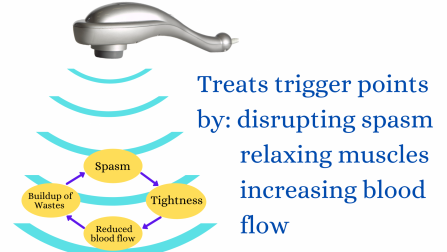
Why vibration massage works
As shown in this diagram the key parts of a trigger point are muscle spasm, muscle tightness, restricted blood flow, and a build up of toxic wastes. Vibrations have been shown to help all of these. For more information please see our guide The scientifically proven effects of vibration massage- with clinical applications.
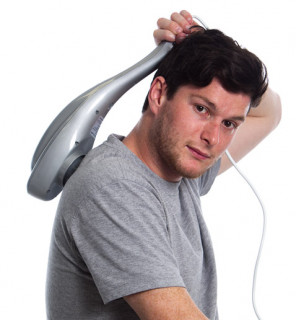
How to use vibration massage
Using vibration massage is extra-ordinarily easy. We ask you to check our vibration massage usage guide for the fine points and precautions, but basically all you need to do is place the vibration massager on the muscle over the trigger point and let the vibrations penetrate for 30-60 seconds. This can easily be repeated every day.
For how to choose an quality massager that will do a great job and that you will be extremely happy with please see our article How to choose a massager, or you can go straight and check out our economical, easy to use professional standard machines: the General Purpose Massager or our Ultimate Quad Head Massager.
How to massage your calf muscles
We’ve seen the muscles involved and looked at some effective self massage therapies. We’ll now look at some specific examples. Although there are many muscles, for self massage it’s easiest to just consider the calf muscles as two groups: the large group at the back and the smaller group to the outside/front. The group at the back has several layers of muscles, but knowing which is which is not that important for home massage. All you need to know is that you will find some issues close to the surface, while others will be much deeper.
Massaging the rear group of muscles.


Massaging the front/outside calf muscles


APPENDIX: Other possible causes of calf pain (9,10)
"Medical" causes
- Calf muscle tear
- deep vein thrombosis (see note below)
- cellulitis
- intramuscular haematoma
- thrombophelbitis
Common for athletes
- Muscle or tendon injury
- periostitis
- stress fracture
- compartment syndrome
Special note: Deep vein thrombosis
Deep vein thrombosis involves blood clots within the veins. If massage dislodges these clots they can block the arteries to your lungs, resulting in serious illness or death.
Other self massage and trigger point therapy articles
If you found this useful please check out our other self massage and trigger point therapy articles.
- Self massage and trigger point therapy for headaches and migraines
- Massage And Trigger Point Therapy For Low Back Pain, With Self Help Options
- Massage And Trigger Point Therapy For Shoulder Pain, With Self Help Options
- Self Massage And Trigger Point Therapy For Tennis Elbow
- Trigger Point Therapy For Fibromyalgia: Inc. Self Help Advice
- Self Massage For High Blood Pressure
- Self Massage For Anxiety
Professionals
DrGraeme massagers were originally built by Dr Graeme for use in his clinic, and to prescribe to his patients for additional self use at home. Now these are used by colleagues and other professionals for similar purposes. If you are a professional and wish to know more about this therapy, or possibly get a sample massager to trial please check out our practitioner page.
References
- Mathias S, Albert P-B, Olivier P, Paolo R, Alexandra Myers E, Carlos L-C. Treatment of the Myofascial Trigger-Points of Triceps Surae: A Systematic Review. Int J Sport Exerc Med. 2019;5(1):1–7.
- Park j. et al. Application of massage for ankle joint flexibility and balance. J Phys Ther Sci. 2017;29:789–92.
- Kim D et. al. The Effects of Myofascial Trigger Point Injections on Nocturnal Calf Cramps. J Am board Fam Med. 2015;28:21–7.
- Prateepavanich p. et. al. The relationship between myofascial trigger points of gastrocnemius muscle and nocturnal calf cramps. J Med Assoc Thai. 1999;82(5):451–9.
- Wang J. Therapeutic effects of massage and electrotherapy on muscle tone , stiffness and muscle contraction following gastrocnemius muscle fatigue. J Phys Ther Sci. 2017;29:144–7.
- Rehman A et. a. COMPARISON OF MASSAGE THERAPY AND PASSIVE STRETCHING FOR REDUCING DOMS OF TIBIALIS. Eur J Heal Sci. 2021;(2):18=29.
- J.Travell. Myofascial pain and dysfunction: the trigger point manual- The lower extremities. Williams & Wilkins; 1992.
- Wamontree P, Kanchanakhan N, Eungpinichpong W, Jeensawek A. Effects of traditional Thai self-massage using a Wilai massage stickTM versus ibuprofen in patients with upper back pain associated with myofascial trigger points: a randomized controlled trial. J Phys Ther Sci. 2015;27(11):3493–7.
- Banerjee A. The assessment of acute calf pain. Postgrad Med J. 1997;73(856):86–8.
- Fredericson M, Wun C. Differential diagnosis of leg pain in the athlete. J Am Podiatr Med Assoc. 2003;93(1–6):321–4.
We are continually adding more information on research and uses. Subscribe below to have us email them to you "hot off the press".

About Dr Graeme
Several years ago Dr Graeme, a Chiropractor practicing in Victoria, Australia was looking for a serious hand held massager his patients could use at home to get the extra quality massage they needed. The ones he found in the shops and on-line for home use looked nice but were not serious, and... read more

